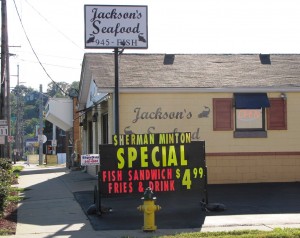 For every dollar spent, 68 cents goes back into the community when a customer makes a purchase at a local business.
For every dollar spent, 68 cents goes back into the community when a customer makes a purchase at a local business.
When a customer makes a purchase at a national chain, however, 43 cents of every dollar goes back into the community.
Money spent at local businesses circulates within the community and pumps money into school systems, social organizations and public parks.
Money spent at national chains, though, such as Walmart, gets deposited into the wallets of surviving family members of Sam Walton, Walmart founder, and the mansions of million-dollar shareholders.
This is the value of buying local.
At the Farmer’s Market every Wednesday and Saturday on the corner of Bank and Market Streets in New Albany, farmers not only sell fresh produce but can explain where and how they grow their produce.
It’s hard enough just finding someone to help lift the 24 pack of water off the top shelf at Walmart, let alone someone who can explain where a customer’s tomato was grown or what pesticides are on that tomato, which will be going into their family’s spaghetti dinner.
The New Albany Exchange, a restaurant on Grant Line Road and UCard vendor, has added local meat to their menu. The meat is from cows that graze the pastures of 3D Valley Farms in Depauw, Ind.
At the farm, cows are raised all natural and are void of growth hormones and antibiotics.
In an article by sustaninabletable.org, it stated that unacceptable levels of contamination are caused by the filthy conditions in which conventional food animals are raised, as well as the high speed at which meat is processed in order to maximize profits.
In an article by the New York Times, “States Look to Ban Efforts to Reveal Farm Abuse,” Wayne Pacelle, the president and chief executive of the Humane Society of the United States, said that secretly recorded videos released last year revealed unsanitary conditions inside egg plants.
One video showed rows of crowded wire cages, some containing injured and disfigured hens, as well as rotting, dead birds.
Employees were seen throwing the birds into bins and talking about how their wings or legs sometimes fell off in the process.
Stacie Bale, Earth Friends Café owner and anti-animal cruelty activist, not only incorporates the cause in her organic dish menu, but she also minimizes her customers’ health risks by researching foods prior to purchasing them and buying locally-grown ingredients.
Sisters Ani and Ali Tucker, owners of The Dandy Lion in downtown New Albany, sell unique, non-mass produced items from local and regional artists.

One grassroots local organization — New Albany First — has found a way to combine local business, promote buying locally and educate the public on the importance of keeping money within the community.
The organization recently began a “Be Local” seminar series. The series provides information about different aspects of independent business ownership and encourages new and prospective local business owners.
At the Farmers’ Market, I bought 2 pounds of fresh summer squash and 2 sweet potatoes for $3.
The farmer explained a few ways to incorporate the vegetables into my family’s dinner — a service that cannot be found at Walmart.
Since “Shermageddon” has struck and the fate of the Sherman Minton Bridge is unknown, some local businesses have questioned their own fate.
Owners were unsure if the lack of traffic across the Sherman Minton Bridge would be a loss or gain for their business.
Indiana customers are becoming aware of local businesses through the avoidance of hours of traffic encountered when entering Louisville.
Embrace the local scene.
Listen to local bands, buy mothers a unique gift for their birthday at a local shop and consume locally-grown foods. This will minimize the risk of high costs for low prices.
BY LEAH TATE
Sports Editor
lmtate@umail.iu.edu
